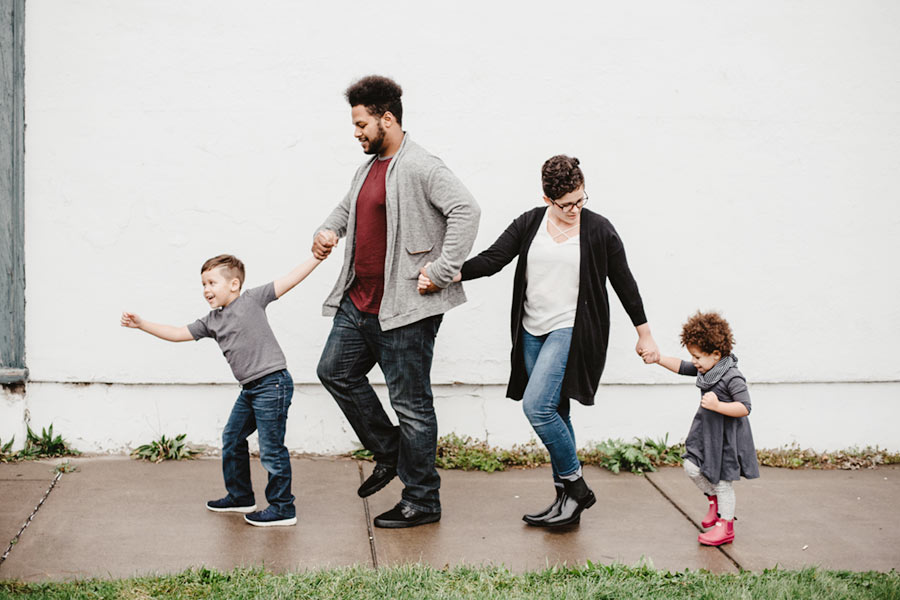
How to share the parenting load in a relationship
Published by Mandi Simons on 4 May 2023
Parenting is a fulfilling and rewarding experience, but at times it may also feel overwhelming and exhausting. Sharing the parenting load with your partner is a way to help alleviate stress and create a stronger bond with your partner.
It’s the 21st century and both parents have a significant role to play in parenting their kids. No one parent should feel that the burden lies solely with them as this imbalance can lead to resentment, burnout, and even divorce. By sharing the parenting load, it is possible for both partners to have fulfilling careers without either of you feeling over burdened.
When you both take responsibility for bringing up your family, it can give you the chance to bond with your children. In our busy lives, we are always on the go, so parenting gives you the opportunity to spend some precious time with your children, reflecting on their day, asking about their interests and what they are up to. However, if one partner is always taking on the majority of the childcare responsibilities, they may feel exhausted and the other partner may get left out and feel disconnected from their children.
Parenting can sometimes cause friction, leading to arguments or bickering over small details. Sharing the parenting gives you both the opportunity to maintain good communication, even when life gets really busy. And this communication will help keep your relationship healthy, as well as make you feel that you are in this together.
It may really help you both to feel appreciated by being supportive of each other. It's easy to get caught up in the day-to-day stresses of life, but it may be an idea to look out for signs that your partner is struggling, so you can support each other. Parenting is a 24/7 job, and it can be exhausting to do it alone. By sharing the responsibilities, both you and your partner can take breaks and have time for self-care, which can help you both recharge your batteries. This could be just a sit down with a book or a coffee, a nice soak in the bath or engaging in some exercise or a hobby away from the house.
Working together in this way may help you both feel that the other person is there to help out if needs be. This could be by offering you time out, just talking through a parenting issues, or just a hug and a cup of tea.
As parents, we all have different strengths and weaknesses but this does not mean that one partner should feel inadequate or incompetent as a parent. One thing you can try as a couple is to recognize each other's strengths and weaknesses, and use these strengths to make parenting more effective, showing appreciation and expressing gratitude towards each other when needed. You are much stronger as a team.
Navigating the seas of parenting together, with all its ups and downs can also help improve communication and problem-solving skills in your relationship. When you are both involved in parenting decisions and responsibilities, you are forced to communicate with each other and work together to solve parenting problems. This can lead to a stronger and more resilient partnership that you can apply to any family situation.
Through shared parenting, you are also setting a positive example for children. When children see both parents involved in the parenting process, they learn that parenting is a team effort and that both men and women can be nurturing and caring parents. This can lead to more gender equality in future generations and can help break down traditional gender roles.
If you and your partner are struggling with the parenting load, consider discussing ways to share the responsibilities and work together as a team. Your relationship and your children will thank you for it.
If you and your partner are struggling with problems in your relationship due to parenting responsibilities, please contact us to see how counselling and psychotherapy in Hampstead or online can help.

The benefits of changing your relationship with your phone
Published by Mandi Simons on 19 April 2023
Since smartphones became a part of our lives over 10 years ago, the way that we have used them has changed dramatically. For many, the positive benefits of smartphones include being able to work from anywhere and communicate on the go. But for others, the relationship with their phone has gone unchecked, almost turning into an obsession, with many young people only communicating through their phones. This has had an impact on relationships, the way we interact and behave, not to mention our mental health.
However, while this unhealthy relationship looked to be getting out of control, more and more, people are choosing to take back control of their smartphone and how they use it, which can have huge benefits on our relationships, the way we communicate and our mental health. Here are a few ways that people are changing their behaviour with their phones so they can live happy, connected and fulfilled lives.
How Do Not Disturb
For many years, this function went unused. Why would you want to put your phone on do not disturb? But many people are using do not disturb to limit the times that their phone can demand their attention. There are so many different do not disturb settings that you can use to limit the constant pinging of messages of notifications so you can focus on a meeting, a conversation, or some well needed relaxation time.
By setting up do not disturb for certain times or situations, you can focus more on living your life in that moment. Whether it’s some time with your family, meal times, relaxing with a glass of wine or a good book. Reducing the distraction from your phone allows you to be present, to focus fully on any given moment and give it your complete attention. This will not only make you feel better, more relaxed, more focused and in control, it can also improve your relationships and communication skills.
How Switching Off Notifications
There’s a reason why the notification tones are so shrill – they are designed to grab your attention. But with all your notifications switched on, barely a minute goes by without your phone demanding that you check it to see what the notification is. By switching off your notifications, you are taking back control of how and when you check your phone for messages etc.
Removing your phone’s ability to demand your attention can really help with anxiety, feeling distracted and you will find you are more able to concentrate and focus on the conversation you are having or the task that you are doing.
How Reducing Screen Time
Many parents limit the amount of screen time that their children can have because they know that affect it can have on a child’s sleep, concentration, and mental health. Yet more and more adults are limiting their own screen time as well. Having a curfew after which, unless it is an emergency, phones go away, or specific times when phones are not allowed can really help improve communication and strengthen relationships. Sitting down for a family dinner without phones at the table gives you and your family time to connect, to catch up and be present. Putting phones away long before bedtime is also a great way to spend quality time with your family, while preparing for a good night’s sleep.
There is no doubt that there are huge benefits to owning a smartphone. But by changing our relationship with our phones, it is possible to avoid the inherent dangers, and still manage to be productive, to be mindful and present, to improve communication and spend quality time with friends and family, without going completely off grid.

Maintaining a healthy relationship through financial difficulties
Published by Mandi Simons on 23 March 2023
The last few years have been tough on many families. The stresses of covid and lockdown, with many people losing their jobs, and the cost of living crisis, have put many families under increasing financial pressure. It's understandable that one of the main reasons cited for relationship problems is money.
If you and your partner are struggling with money, it can be very difficult to cope with the situation. Learning how to deal with financial worries in a relationship will help both of you through this difficult time and ensure that your relationship does not suffer as a result.
How to cope with financial worries in a relationship
It's important to remember that financial difficulties are not just a problem for one person in your relationship. You both have a stake in it, and working together to find solutions can feel collaborative and supportive. Using this approach, when one of you is struggling to cope, you have each other to depend upon, which can strengthen your relationship.
Talking about the issue openly and regularly is a great way to share the burden and prevent just one of you from feeling the pressure alone. It’s important to be honest and open with each other and try not to blame each other or make accusations about who is responsible for causing the problem. Instead, it is helpful to focus on finding solutions together! If one of you feels like they're being taken advantage of the other person, talk about ways that could change, without blaming each other or losing trust.
If you're the one who is struggling with money, note that your partner isn't necessarily responsible for your problems. It's important to talk about how you can both help each other out instead of making one another feel guilty or burdened by their role in the issue.
While money issues can be stressful, it’s important to still try to find the time to have fun in your relationship. This does not need to be expensive: going for a walk together, enjoying a hobby together or having a date night at home are all cost effective ways to strengthen the bond between you without having to spend much money.
It is also a good idea to make time for your relationship in other ways – don’t let your financial worries be all that you talk about. This could include spending time together, showing your love for each other and remaining intimate – all of which will make you both feel that you are united in your struggles and help you get through it together.
While money problems can be difficult to deal, being empathetic towards each other and understanding the challenges involved in dealing with financial difficulties, couples can overcome these issues together.
If you and your partner are struggling with anxiety caused by financial problems, please contact us to see how counselling and psychotherapy in Hampstead or online can help.

Post Lockdown Anxiety in Teenagers
Published by Mandi Simons on 11 January 2023
For many of us, lockdown meant spending more time at home, avoiding contact with friends and family for nearly two years. We were encouraged to shift our behaviour so we spent more time at home, in front of screens, with limited face to face interactions. For many adults, lockdown was a challenge, juggling the pressures of work and family life. However, for many young people, lock down didn’t feel as traumatic; it felt safe, comforting and reassuring, being in the heart of the family and away from the many pressures that teenagers face today, from school, peers, and social media.
For adults, going back to ‘normal’ meant reconnecting and spending quality time with friends, family and colleagues. It meant dusting off already fully formed social skills and starting where they left off. Even so, for many adults, getting back to normal still took a bit of time to readjust.
However, for many young people, the two years in lockdown came at a time when they were going through social and developmental changes. Their social skills were still developing, they were learning how to form friendships and establish themselves in their social groups. In that time, many young people were also going through some major hormonal, cognitive and physical changes. Consequently, going back to 'normal’ filled many teenagers with fear and anxiety as for them, everything had changed.
Post lockdown anxieties
The pandemic was responsible for a new form of anxiety. Some may have lost a loved one during the pandemic, parents may have lost their jobs and suffered financial problems. This may have increased their anxiety about the world in which they live, how secure their lives are and what the future holds for them.
Going back to school is tough for teenagers after school holidays and it is perfectly normal to feel anxious about a new term or a new school year, so returning to school after two disrupted years is bound to evoke powerful feelings of fear and anxiety.
Young people may be worried about the work they have missed, their friendship groups, new teachers, or upcoming exams. They may also be anxious about going back to the same issues they were dealing with before, such as bullying or feelings of isolation.
Young people may feel that they are starting from scratch again, as after two years, they feel and look like different people so they may be worried about how people will accept them and how they feel about themselves.
All of these pressures may leave them feeling like they don’t want to leave the safety of their home environment. This may affect their mood, their sleep and can leave them feeling depressed and anxious.
Through lockdown, social media was a way for young people to maintain connections with their friends. But now society is returning to normal, young people are inundated with the increased pressures from social media that were there before, only now it seems far more intense. This flood of information and the pressure to conform may be difficult for young people to cope with and increase their feelings of anxiety, which alongside other fears and worries they may have, may make returning to school and pre-lockdown life, all the more challenging.
If you or your child are experiencing any symptoms of post lockdown anxiety, please contact us to see how counselling and psychotherapy in Hampstead or online can help.

2022
How to support a loved one with anxiety
What is Social Anxiety?
The Damaging Effect of Social Media on Teenage Mental Health
The Importance of Opening Up About Menopause
Why Loneliness Is Such a Problem for Young People in 2022
Mental Health Awareness Week 2022: The Impact of Loneliness
How Do I Choose the Right Therapist for Me?
What is Social Anxiety?
The Damaging Effect of Social Media on Teenage Mental Health
The Importance of Opening Up About Menopause
Why Loneliness Is Such a Problem for Young People in 2022
Mental Health Awareness Week 2022: The Impact of Loneliness
How Do I Choose the Right Therapist for Me?

-fw.jpg/$file/blog-card-2020-exercise($1$)-fw.jpg)